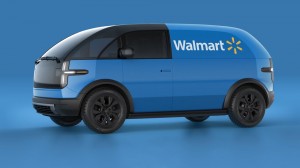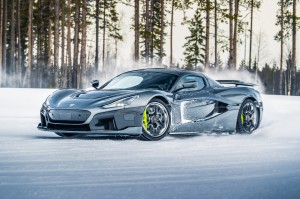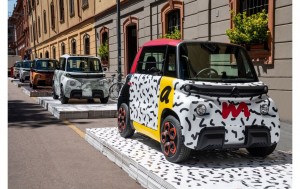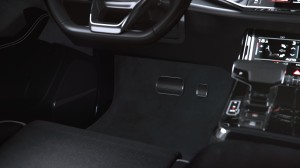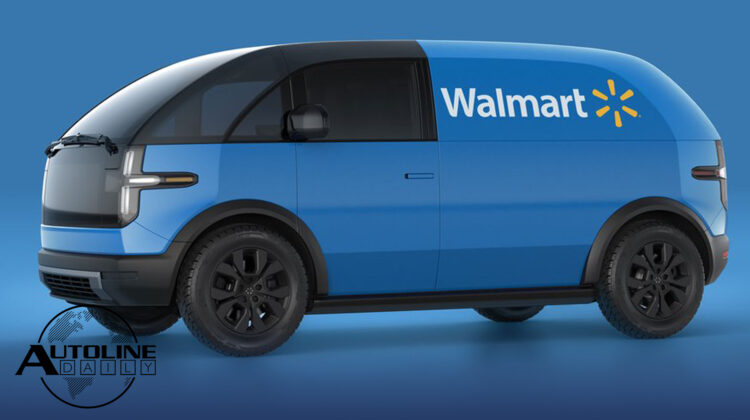
Listen to “AD #3360 – Walmart Probably Just Saved Canoo; Porsche Confirms 911 Hybrid; Hella to Mass Produce Brake-By-Wire” on Spreaker.
Follow us on social media:
Runtime: 9:21
0:07 Rivian Plans for Job Cuts
0:44 Walmart Buys EV Delivery Vans from Canoo
1:17 BMW Charging for Convenience Features
2:42 Ford Files Trademark for EV Ranger & Maverick
3:26 Rimac Nevera Rated by the EPA
4:25 Porsche Confirms 911 Hybrid
5:24 Citroen Ami Sales Pretty Weak
7:00 Hella to Mass Produce Brake-By-Wire
7:41 Mercedes Partners with Tencent for AVs in China
Visit our sponsors to thank them for their support of Autoline Daily: Bridgestone, Intrepid Control Systems, MEDC and Schaeffler.
This is Autoline Daily, the show dedicated to enthusiasts of the global automotive industry.
RIVIAN PLANS FOR JOB CUTS
It isn’t easy being an EV startup, even if you have $17 billion in the bank. Bloomberg reports that Rivian is considering laying off about 700 employees, or about 5% of its workforce, but that does not include anybody that’s involved in manufacturing. It’s struggling through the chip shortage and will build only about 25,000 trucks, SUVs and vans this year. That is severely restricting its cash flow. And it’s not just Rivian. Elon Musk says Tesla is going to lay off 10% of its salaried workforce.
WALMART PROBABLY JUST SAVED CANOO
But one EV startup just got thrown a lifeline. Walmart says it will buy 4,500 electric delivery vans from Canoo and has the option to buy up to 10,000. Earlier this year Canoo warned investors that it was running out of cash and may not be able to carry on, so the order from Walmart probably just saved the company. Canoo faces competition from Rivian, which is selling vans to Amazon, and from GM’s Brightdrop which is selling vans to both FedEx and Walmart.
BMW CHARGING FOR CONVENIENCE FEATURES
BMW is once again charging customers for features that most get for free. This time it’s in South Korea. The automaker is charging $18 a month for heated seats or $176 for the year or if customers want the feature permanently, it will cost more than $400. A heated steering wheel costs $10 a month or $92 for the year, while Apple CarPlay is just a shade above $300. A few years back, BMW started charging a yearly fee for CarPlay in the U.S. but it quickly reversed that decision after customers revolted. However, this is just the beginning. Automakers expect to make big bucks charging for extra features and connected services.
FORD FILES TRADEMARK FOR EV RANGER & MAVERICK
Ford’s EV strategy so far has been to first electrify its most iconic models; Mustang, F-150 and Transit. But we’re starting to see a trickle down to its other vehicles. Ford filed trademarks for electric versions of the Ranger and Maverick pickups in both the U.S. and Europe. And interestingly, it filed for different names. In Europe it filed for Ranger Lightning and Maverick Lightning, which obviously follows the new F-150 Lightning. However, in the U.S. it wants to trademark Ranger Thunder and Maverick Thunder. And that could be a new name for Ford’s electric trucks. It also filed for F-150 Thunder in the U.S. last month.
RIMAC NEVERA RATED BY THE EPA
Last year, the Croatian specialty-vehicle maker Rimac unveiled this electric supercar called the Nevera. And now its received EPA and CARB certification and is rated at 287 miles of range on a single charge. The supercar is rated at 342 miles on the easier European WLTP cycle. The Nevera has some serious get-up-and-go with over 1,900 horsepower, a top speed of nearly 260 MPH and a 0 to 60 MPH time of 1.85 seconds. It features a 120-kWh battery along with four surface-mounted permanent magnet motors that drive each wheel individually. The Nevera is also going to be exclusive, only 150 will be built and it will have a price tag of more than $2 million.
PORSCHE CONFIRMS 911 HYBRID
The Porsche 911 is going electric. CEO Oliver Blume confirmed it will come out with a “very sporty hybrid” version of the 911 that will use a similar setup to its race cars. Blume also says Porsche is committed to a double-e path; e-mobility and e-fuels. Last year, it delivered 41,000 Taycans and by the end of the decade Porsche wants 80% of its sales to be all-electric. He hopes the remaining 20% of vehicles will run on e-fuels or synthetic fuels. But Blume says the fuel needs to be produced sustainably and in areas with abundant renewable energy, which will offset higher energy consumption during production. The CEO thinks that if produced on an industrial scale, and that’s a big if, prices of less than $2 per liter or about $8 a gallon are possible.
CITROEN AMI SALES PRETTY WEAK
Not all cheap EVs are created equal. Wuling sells about as many or more MINI EVs in a month as Citroen has sold AMIs since launching more than two years ago. Prices for the AMI range from about $7,000 to $10,000 in Europe, while the MINI EV starts just over $4,000. But Citroen says it’s only received a little more than 23,000 orders for the small electric car. That’s even way less than the Taycan that we just talked about at 41,000 units and it’s way more expensive. This is probably why we’re seeing the AMI platform being spread across Stellantis’ other brands, including its mobility company, Free2Move.
HELLA TO MASS PRODUCE BRAKE-BY-WIRE PEDAL
Brake-by-wire could really start to catch on. The supplier Hella, which is now part of Forvia, is going into mass production with a brake-by-wire brake pedal. Those pedals are for a German car company in 2025, but Hella did not reveal which one. The pedal simulates the feel and effort of a conventional brake pedal even though it’s just sending out an electric signal and has no mechanical connection to the braking system. And because it’s adjustable, the feel and effort can be changed for different driving situations. Hella says it uses fewer parts and is easier to attach to a vehicle going down the assembly line. (Video of brake-by-wire available on Hella’s Facebook page).
MERCEDES PARTNERS WITH TENCENT FOR AVs IN CHINA
Mercedes is partnering with Chinese tech company Tencent to develop autonomous vehicles. The two companies plan to open an R&D lab in China to test and develop the technology. Tencent will provide its IT architecture and platform to make sure the AV tech has stable cloud service and Tencent’s V2X connected-tech security will allow the self-driving vehicles to work properly in China. The two companies have been collaborating since 2015 with the automaker using Tencent’s MyCar service in its vehicles. Mercedes is also working with NVIDIA to develop AV technology.
We’ve got a great Autoline After Hours with the legendary Peter Brock coming up this Thursday. When he was only 19 years old he was hired by General Motors Design and essentially did the original Corvette StingRay. Later he designed the Shelby Daytona Coupe. And his BRE, or Brock Racing Enterprises, became a formidable force racing Datsuns in the 1970s. He has an amazing life story and you can learn all about it later this week on Autoline After Hours.
But that wraps up today’s show, thanks for watching.
Thanks to our partner for embedding Autoline Daily on its website: WardsAuto.com
Seamus and Sean McElroy cover the latest news in the automotive industry for Autoline Daily.




